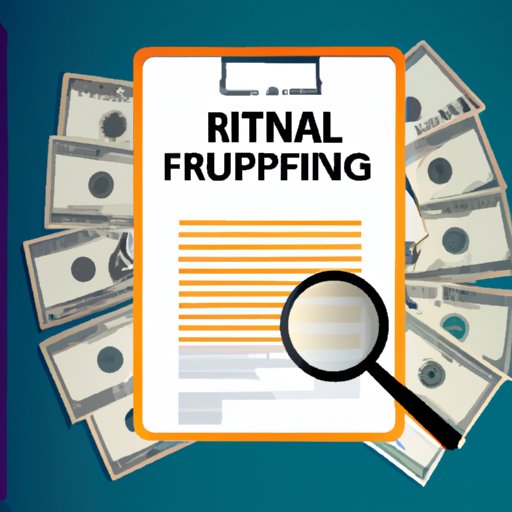Introduction
Financial crime is defined as an illegal activity that is committed for financial gain. It can include activities such as money laundering, fraud, embezzlement and tax evasion. Financial crime can have serious consequences for both individuals and businesses, including financial losses and damage to reputations.

Steps for Reporting Financial Crime
If you suspect that someone has committed a financial crime, there are several steps you can take to report it. The first step is to determine who to report the crime to. Depending on the type of crime, this could be your local police department, the FBI, or a government agency such as the IRS or SEC.
The next step is to gather all of the information that you have about the crime. This should include any evidence you have, such as documents, emails, or bank statements. You should also provide detailed descriptions of the events leading up to the crime, as well as any other relevant information.
Once you have gathered all of the necessary information, you can file a financial crime report with the appropriate authorities. Most agencies have online forms that you can fill out to submit your report. You may also be able to contact the agency directly by phone or email.
Recognizing Common Signs of Financial Crime
In addition to reporting financial crime, it is important to be aware of the warning signs that could indicate that someone is a potential victim of financial crime. These signs can include sudden changes in financial behavior, such as large cash withdrawals or unexplained transfers of funds.
Another red flag is when someone is unwilling or unable to explain where their money is coming from. If someone is receiving a large amount of money without any explanation as to its source, it could be a sign that they are involved in a financial crime.

Role of Law Enforcement in Investigating Financial Crime Cases
Once a financial crime has been reported, law enforcement will begin an investigation into the case. The investigation process can vary depending on the type of crime and the amount of evidence available. In some cases, the investigation may involve interviewing witnesses and collecting documents. In other cases, more complex techniques, such as forensic accounting, may be used.
Once the investigation is complete, law enforcement will decide whether or not to prosecute the case. If the evidence is sufficient, the case will be taken to court and the perpetrator may be sentenced.

Maintaining Records When Reporting Financial Crime
When reporting a financial crime, it is important to keep detailed records of the incident. This includes any documents that relate to the crime, such as bank statements or emails. Keeping records of the incident can help law enforcement in their investigation and can also be useful if you need to file a lawsuit against the perpetrator.
You should also keep copies of any reports that you have filed with law enforcement. This can help to ensure that your report is taken seriously and that the appropriate actions are taken.
Benefits of Reporting Financial Crime and Consequences of Not Doing So
There are many benefits to reporting financial crime. By reporting a crime, you can help to protect individuals and businesses from becoming victims of fraud. You can also help law enforcement to investigate and prosecute criminals, which can ultimately lead to reduced levels of financial crime in society.
On the other hand, failing to report a financial crime can have serious consequences. Not only can it lead to further financial losses for victims, but it can also lead to criminal charges against those who fail to report the crime.
Conclusion
Reporting financial crime is essential for protecting individuals and businesses from fraudsters. By understanding the steps, signs and benefits of reporting financial crime, you can help to reduce the amount of financial crime in society. Remember to always keep detailed records when reporting a financial crime, as this can help law enforcement in their investigation and prosecution.
(Note: Is this article not meeting your expectations? Do you have knowledge or insights to share? Unlock new opportunities and expand your reach by joining our authors team. Click Registration to join us and share your expertise with our readers.)
